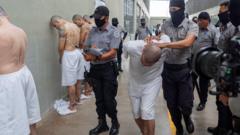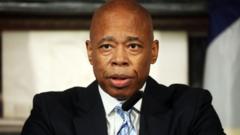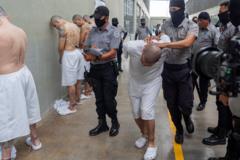The US has deported 17 alleged gang members to El Salvador despite ongoing legal challenges regarding the use of the Alien Enemies Act for immigration purposes. Officials claim these individuals pose significant threats, but many families contest their alleged gang affiliations.
US Continues Deportations of Alleged Gang Members to El Salvador Amid Legal Challenges

US Continues Deportations of Alleged Gang Members to El Salvador Amid Legal Challenges
The US government's recent deportation of alleged gang members to El Salvador raises legal concerns, highlighting the complexities of immigration policy and international agreements.
The US government, under the Trump administration, has proceeded with the deportation of 17 alleged gang members to El Salvador, as stated by the US State Department. This decision occurs amidst legal challenges concerning the removal of individuals to El Salvador's notorious supermax prison. US Secretary of State Marco Rubio identified those deported as affiliated with the Tren de Aragua and MS-13 gangs, which have been linked to organized crime and violence.
According to Salvadoran government officials, the deported individuals include both Salvadorans and Venezuelans. Despite a recent court ruling that temporarily halted deportations stemming from the Alien Enemies Act, which has historically been utilized in wartime, reports indicate that this latest group was deported under standard immigration regulations.
In his statement, Rubio labeled the deportees as "murderers and rapists," although specifics regarding their criminal histories or any convictions were not disclosed. Following the deportations, El Salvador’s President Nayib Bukele shared a video displaying the men being unloaded from a plane, their heads shaved before being placed into confinement. He emphasized that the individuals included serious offenders, some of whom allegedly perpetrated child sexual crimes, framing the deportation as part of a broader strategy against terrorism and organized crime.
President Trump echoed Bukele's sentiments on social media, criticizing his predecessor Joe Biden's immigration policies and commending El Salvador for accommodating these individuals. In a financial agreement reported alongside the deportations, El Salvador reportedly accepted a payment of $6 million (£4.6m) from the US to take in the deportees.
However, the families of some individuals previously deported have strongly denounced any claims of gang involvement, asserting that their relatives are innocent. Legal battles are ongoing, particularly after Trump invoked the Alien Enemies Act earlier this month to conduct deportations of Venezuelans, prompting civil rights organizations like the American Civil Liberties Union to challenge the administration’s adherence to due process.
In a recent development, federal judge James Boasberg issued a temporary restraining order against the law’s use for deportations, mandating that flights already en route to deport individuals be turned back. The controversy surrounding these deportations continues as the next court hearing focuses on this contentious issue.



















